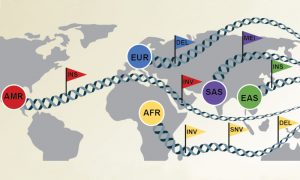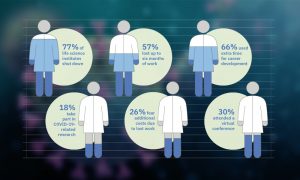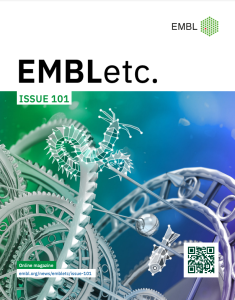28 May 2024

Science & Technology
Blood stem cells from healthy people carry major chromosomal alterations, a study in Nature Genetics by researchers at the Max Delbrück Center and the European Molecular Biology Laboratory (EMBL) finds. The discovery suggests that we are all genetic mosaics, which may contribute to ageing-related…
22 March 2023

Using Oxford Nanopore long-read sequencing, EMBL scientists sequenced a primary childhood brain tumour known as a medulloblastoma, uncovering a novel complex mutation pattern.
6 May 2022

Science & Technology
Researchers at EMBL Heidelberg found that inversions in the human genome are more common than previously thought, which impacts our understanding of certain genetic diseases.
2022
sciencescience-technology
25 February 2021

Science & Technology
A collaboration including EMBL scientists has created the most diverse set of reference human genomes ever assembled.
2021
sciencescience-technology
30 June 2020

ConnectionsLab Matters
A national consortium including EMBL and the DKFZ is set to launch the German Human Genome–Phenome Archive, creating an invaluable bridge between fundamental biomedical research and applied healthcare.
2020
connectionslab-matters
22 June 2020

Lab MattersScience & Technology
Jan Korbel and Oliver Stegle have performed a survey of fellow life scientists to learn how the current crisis, with partial or complete institutional shutdowns, is affecting their work.
2020
lab-mattersscience-technology
1 April 2020

Science & Technology
The causes of 40 percent of all cases of certain medulloblastoma – dangerous brain tumours affecting children – are hereditary. These are the findings of a recent genetic analysis carried out by scientists from EMBL and numerous colleagues around the world.
2020
sciencescience-technology
2 February 2011
Science & Technology
A detailed analysis of data from 185 human genomes sequenced in the course of the 1000 Genomes Project, by scientists at the European Molecular Biology Laboratory (EMBL) in Heidelberg, Germany, in collaboration with researchers at the Wellcome Trust Sanger Institute in Cambridge, UK, as well as the…
2011
sciencescience-technology
27 October 2010
Science & Technology
The 1000 Genomes Project, a major international collaboration to build a detailed map of human genetic variation, has completed its pilot phase. The results are now published in the journal Nature and freely available through the European Molecular Biology Laboratory’s European Bioinformatics…
2010
sciencescience-technology
18 March 2010
Science & Technology
Once the human genome was sequenced in 2001, the hunt was on for the genes that make each of us unique. But scientists at the European Molecular Biology Laboratory (EMBL) in Heidelberg, Germany, and Yale and Stanford Universities in the USA, have found that we differ from each other mainly because…
2010
sciencescience-technology










